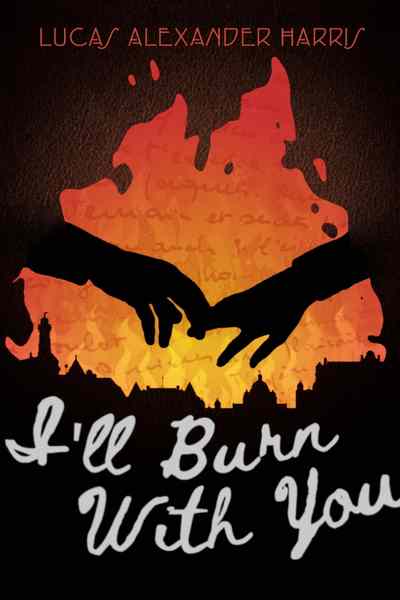The wood-burning stove crackled in the corner, trying to shield the room from the outside cold. The door back outside propped open, the brisk wind blew through. The lantern above swayed quietly in the breeze. A wall of posters, advertisements, upcoming celebrations, and memorials crowded together, their colors having long since faded. Behind the counters were slots for outgoing and incoming mail, sorted and ready for the following morning’s rounds. Beyond that, Ben wasn’t sure.
Mr. McClintock, the oldest postman serving Durmont and Norton, hunched over the stovetop, warming his hands, his great graying beard and mustache tinted orange. A bag of mail was left at his feet.
Ben shuffled past.
“Price, I – the younger one,” Mr. McClintock started, his voice low and gruff, “I’ll give you five cents to move that for me.”
His eyes widened. Without thinking, Ben reached down to grab it. It was too heavy.
Mr. McClintock scoffed, rolling his eyes.
“Enough, Gerald. There is no reason to be unkind,” Mr. Pryce chastised. “That cost will come out of your paycheck.”
“He did not have to do it,” Mr. McClintock retorted, rubbing his hands, fingers blushed red from the wind. He reached for the mailbag. “Give it here, Ben.”
“It’s too late,” Mr. Pryce snapped back. “Regardless, it is unkind.”
“‘Unkind’,” Mr. McClintock grumbled. “Hah.”
Ben frowned, his face burning, dragging the heavy bag across the wooden floor. He offered it to Mr. Pryce, who swung it behind the desk.
Mr. Pryce nudged out a stool from behind the desk, a first-aid kit in his hands. “Sit.”
He sat. Ben gently removed his shoe, finding spots of blood under the already mud-smeared sock. Paralyzed for a moment, surprised yet numb to the pain, he asked, “H-how’s your wife?”
The older man let a soft smirk grow on his face, his eyes focused. “She is well.” Mr. Pryce’s eyes darted to him for a moment. “Thomas has started lessons with the piano with a neighbor. Mary tells me he is trying, but is positively dreadful.” He laughed, flashing his yellowed, crooked teeth as he did. He re-positioned himself, wrapping Ben’s foot with a bandage. That soft smirk stayed. “Wilbur has grown tremendously. She sends another photograph.” Before Ben could say anything, Mr. Pryce stood, moving around the desk, grabbing the photo, and depositing himself back at the young teen’s feet. He held the picture up.
The child was still plump but less round. He sat in Mary Pryce’s arms, their faces blank.
Ben could only smile warily. He did not know what to say to that, wishing to share in the kindness the postman showed him. Unrelated by blood, Ben felt seen by Mr. Pryce, never spoken down to. The tone in his voice rarely sparked fear in him. He did that to himself.
Mr. Pryce slipped the photograph into his pocket as he continued wrapping the dressing. “She asks about you.” He paused. “May I write back about you?”
He flushed yet found himself saying, “I – no.”
Mr. McClintock stepped around his associate, moving into the space behind the desk.
Mr. Pryce did not understand; that was plainly clear. He, however, did not ask why, glancing down with the soft smile still on his face. The older man regularly compared Ben to his son, whom he spoke about with a gleam of warmth in his eyes.
It made Ben deeply uncomfortable. At the same time, he yearned.
“May I say you are well, at least?”
Still, Ben’s cheeks reddened at the question, the consideration. “...yeah.”
Mr. Pryce’s smile stayed. He nodded, finishing wrapping his foot. “Let me get you new shoes.”
Ben drew in a breath. “M-Mr. Pryce, I-I don’t – !”
The man shook his head. “We have some set for donating to the Foundlings Home in Meyers,” Mr. Pryce explained. “I doubt they will miss one pair.” He leaned forward. “If they do, I would be more than happy to lend them some of Gerald’s money as compensation.”
“I heard that,” Mr. McClintock called, standing, a round parcel in his arms. “I have already lost five cents to you. You cannot take more away from me!”
Mr. Pryce laughed again, standing to return behind the desk.
Ben offered his own smile, a small one. He tried offering his own breathless laugh but couldn’t. His hands, however, trembled less. He stayed seated, occupying as small a space as humanely possible. Ben kept his eyes on the always aloof Mr. McClintock, sorting mail into their respective cubbies with little regard for his presence; he did not mind, though. The sight was comforting, in a strange, awkward sense. Watching Mr. McClintock sort the mail into the numbered spots, it made sense to him. He did not understand it, either.
Mr. Pryce returned, a pair of black boots in his grip. “I’ve tried to match them as best I can,” he said, offering them to the young man. “I know how your father can be.”
“H-he doesn’t – “He did not finish the thought. Something told him not to. Ben’s hands fell flat in his lap. “...thank you, sir.” He took the boots and slipped them on. His toes scrunched together to fit into them.
Mr. Pryce stood, waiting.
“A-a little tight,” he admitted, meeting the man’s stare. “I – can I still have them?”
He nodded, turning his head to the side. “I would not have offered them if I couldn’t give you them.”
Ben nodded, standing. “I – thank you, sir, but I gotta go, now.”
Mr. Pryce smirked. “Come back any time, Mr. Price.”
Glancing at him, Mr. McClintock said nothing.
The young teen stood. He nearly started off when the poster caught his attention again; its colors faded and worn, printed two years ago. Ben approached, studying the address, the phone number; the thought of calling someone made him slightly giddy. Its carefully typed letters, once crisp and clean, appeared as the color of dissipating smoke. “Hutchinson Academic Scholarship Society” spread across the top, arched and embellished. Ben did not bite the inside of his cheek. “What is this?” he found himself asking. Immediately, he felt stupid.
“Can you read?” piqued Mr. McClintock.
“Gerald,” Mr. Pryce chastised.
“Good God,” the other man sighed. He returned to sorting mail.
Ben opened his mouth. He stepped forward once, his hands folded back into each other, eyes scanning over the information about the scholarship. “May...” He sighed, his gaze dipping to the floor. “May I...are there any – ” He grunted, closing his eyes. “I – sorry, I...I don’t know what I’m sayin’.”
Mr. Pryce crossed behind the desk, moving the chair back in the process. “Families in Allisport who wish to take part sponsor a handful of children every year for higher education who, otherwise, wouldn’t have access.”
The teen let out a low hum, his eyes scanning the other fliers, disinterested. “Oh.”
A pause before Mr. Pryce drew in a breath. “We might have some forms from last year, I believe,” he continued, “when Mrs. Glick asked for some for the children in the Foundling Home. She never came to pick them up.”
Ben turned, the leather of his shoes rubbing against his toes.
“You may have one if you’d like.”
He shook his head, eyes darted away. “Thank you...fer the offer, Mr. Pryce.”
The postman tipped his hat. “Best get home, now,” he said. “It’ll be dark soon.”
He nodded, taking the steps back down to the road. Pulling his flat cap down further over his eyes, he pressed forward. The early-November wind seemed to pick up, blowing through his thin clothes, burning cold against his skin. He wished the light would stay longer, the world already starting its descent into night. It would only be a matter of time before the snow would come.
Broad Street had quieted under the glow of the gas lamps as the darkness encroached. A few shops had darkened their windows for the day already, but not the general store. Indeed, it was the best-lit building on the entire block, four gasoliers illuminating the merchandise in a dull, golden haze. Glancing down, studying his feet stepping in the new shoes, fear shot through him. Rounding the corner, he kicked and scratched and desperately tried to wear them down further. ‘If Papa found out,’ he started, unable to finish the thought. He scuffed them faster.
“There you are,” his father sighed, two customers turning their heads as the door opened, bringing in a cool breeze. “Benjamin, Theodore ’nd I ’re workin’.” A book dropped into his son’s hands. “Go make yourself useful ‘nd count the inventory.”
Ben said nothing. He probably had spent too long at the post office, anyway. He needed to make it up to his father somehow.
“I’m sorry,” he said, laughing as he opened the door to the back storeroom. “You know my son.”
The customers offered polite laughter strained with awkwardness. They said nothing of it.
Frowning, Ben disappeared, pressing the storeroom door closed behind him. No one would need him. He knew that.
Sifting through expected orders, he turned his eyes towards the inventory and started counting.














Comments (7)
See all